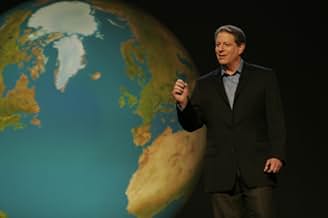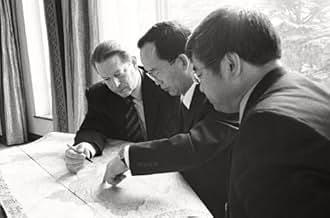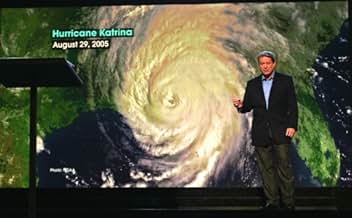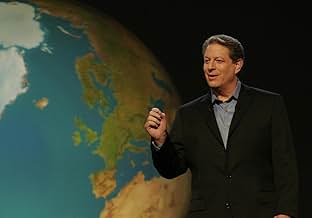AVALIAÇÃO DA IMDb
7,4/10
86 mil
SUA AVALIAÇÃO
Davis Guggenheim segue Al Gore em suas palestras enquanto o ex-candidato presidencial faz campanha para aumentar a conscientização sobre os perigos do aquecimento global e pede ações para co... Ler tudoDavis Guggenheim segue Al Gore em suas palestras enquanto o ex-candidato presidencial faz campanha para aumentar a conscientização sobre os perigos do aquecimento global e pede ações para conter seus efeitos no meio ambiente.Davis Guggenheim segue Al Gore em suas palestras enquanto o ex-candidato presidencial faz campanha para aumentar a conscientização sobre os perigos do aquecimento global e pede ações para conter seus efeitos no meio ambiente.
- Direção
- Roteirista
- Artistas
- Ganhou 2 Oscars
- 34 vitórias e 11 indicações no total
George Bush
- Self
- (cenas de arquivo)
- (não creditado)
George W. Bush
- Self
- (cenas de arquivo)
- (não creditado)
Ronald Reagan
- Self
- (cenas de arquivo)
- (não creditado)
Avaliações em destaque
Before seeing this movie I thought that it might sway the debate on global warming. I assumed that the entire movie was going to be about global warming, and if it had been it would have been much more effective. While about two-thirds of it is about global warming, the other third is a promo for Al Gore--including footage of the contentious 2000 presidential election. As someone who is deeply concerned about the issue of global warming, I am disappointed because I think this diversion from the ostensible subject of the movie makes it much less effective as rhetoric. It has the immediate effect of alienating any republicans that may be in the audience, and global warming should not be seen as a partisan issue, or nothing will ever get done. I'm afraid that because of this the movie will mostly be "preaching to the choir." It still may be an effective tool for educating democrats that were previously uninformed on global warming. As a doctoral student in climate science, I can say that Gore mostly gets the science right, although he weakens the presentation by not pointing out which things are still open to debate.
In the early 90's the CIA changed its charter from monitoring the Soviets to looking at all serious threats to the nation. Out of this came Project Medea, focused on climate change. Using classified intelligence much of it still classified this large project concluded absolutely that global warming was occurring and that it was an immanent threat to the nation. This was reported in public by the Director in 1996.
When Bush came to power, the project was dismantled by Cheney who as Secretary of Defense fought the establishment of Medea. The results were buried and denied and Bush went on record saying that climate change was a hoax. (Both he and McCain now admit that climate change is occurring but that we need to "be deliberate" and "cost effective" in responding. You know what that means.)
Some of the material from Medea is used in this movie: the Arctic Ice Cap thickness survey, but if Gore (who was briefed at the time) could have used that larger material, his case would have been even stronger. It is strong enough, despite a few unnecessarily dramatic photographic effects that bend the context here and there. That classified science might not have made for a cinematic presentation because much of it deals with extinction-scale pandemics.
The presentation program used here is KeyNote, Apple's competitor to Microsoft's PowerPoint. Its worth noting that it is a very snazzy product. Apparently much of the design from that period came from the wishes of Gore for this project and the demands of Steve Jobs for his own keynote speeches. Its a great story by itself.
In terms of narrative construction, there are two stories here. One is the story of the collapse of the Earth's weather system. Frankly, I think he could have done a better job on this. The science is complex but overwhelming. But it does not lend itself well to pictures or simple predictions.
To make this palatable, you need a wrapper story, a framing narrative. What's refreshing about this is that the usual choice wasn't made: to focus on the "conspiracy" of climate change deniers, a couple of outlier scientists and a passel of industry groups and ideologue political organizations. Instead, they chose to wrap the slideshow with a story of redemptive idealism about the presenter. I think it works, but it carries baggage.
About two fifths of the electorate voted against this guy, and many of those did because they preferred a different myth, a different story. That's a pretty heavy burden to overcome if what you want to do is lubricate the essential message. I had only a little trouble with it because I know how truly earnest he is. But earnestness and dedication isn't science, and facts, truth is supposed to be the issue at core.
You cannot be successful in advertising that with personal voyages and memories.
But so far as the slide show. Its definitely worth watching.
Ted's Evaluation -- 3 of 3: Worth watching.
When Bush came to power, the project was dismantled by Cheney who as Secretary of Defense fought the establishment of Medea. The results were buried and denied and Bush went on record saying that climate change was a hoax. (Both he and McCain now admit that climate change is occurring but that we need to "be deliberate" and "cost effective" in responding. You know what that means.)
Some of the material from Medea is used in this movie: the Arctic Ice Cap thickness survey, but if Gore (who was briefed at the time) could have used that larger material, his case would have been even stronger. It is strong enough, despite a few unnecessarily dramatic photographic effects that bend the context here and there. That classified science might not have made for a cinematic presentation because much of it deals with extinction-scale pandemics.
The presentation program used here is KeyNote, Apple's competitor to Microsoft's PowerPoint. Its worth noting that it is a very snazzy product. Apparently much of the design from that period came from the wishes of Gore for this project and the demands of Steve Jobs for his own keynote speeches. Its a great story by itself.
In terms of narrative construction, there are two stories here. One is the story of the collapse of the Earth's weather system. Frankly, I think he could have done a better job on this. The science is complex but overwhelming. But it does not lend itself well to pictures or simple predictions.
To make this palatable, you need a wrapper story, a framing narrative. What's refreshing about this is that the usual choice wasn't made: to focus on the "conspiracy" of climate change deniers, a couple of outlier scientists and a passel of industry groups and ideologue political organizations. Instead, they chose to wrap the slideshow with a story of redemptive idealism about the presenter. I think it works, but it carries baggage.
About two fifths of the electorate voted against this guy, and many of those did because they preferred a different myth, a different story. That's a pretty heavy burden to overcome if what you want to do is lubricate the essential message. I had only a little trouble with it because I know how truly earnest he is. But earnestness and dedication isn't science, and facts, truth is supposed to be the issue at core.
You cannot be successful in advertising that with personal voyages and memories.
But so far as the slide show. Its definitely worth watching.
Ted's Evaluation -- 3 of 3: Worth watching.
I got to see this at Sundance. Sometimes there are documentaries that have been accused of not being straightforward or factual, but this is not one of them. It's very fact based. It had some funny and touching moments, but they were never done at the expense of the integrity of the film. It's very science based but presented in a fascinating way (I have no science background). It was also done on a technical level that was superb. The situation presented on global warming is unsettling, but I appreciate that the filmmakers do end it with some hope. I gave it a 9/10, instead of a 10, because Al Gore (although I respect him more than ever after seeing this) is presented as a lone warrior type in trying to get the message out. I would've liked to have seen a more accurate portrayal of the community of people-- scientists, religious leaders, teachers, etc...-- who speak out for change every day. Still, it alone was worth the trip to Utah.
I thought that this was on the whole a good film - I can imagine it being an EXCELLENT film for teachers to show to a class to explain global warming, actually. It explains the facts very well, explains away the objections that people have been hearing about from the media, and is also pretty funny at times. The film basically consists of a tour of Al Gore's climate change speeches around the world. It is, in essence, one long speech in various cities around the world (Al Gore says that he's given this presentation thousands of times), inter-cut with some various other footage. The film starts off with a few diagrams that many of you will probably have seen already, as well as a rather famous Futurama clip. In fact, if you're well-versed in your science, you'll probably already know much of what Al Gore talks about (though probably not quite all) - this film is really for the general public who doesn't quite know all of this, and also for those who might have heard something about global warming here and there but want to see exactly how all of the facts fit together.
As I said, a very good educational film. The problems come in the short but noticeable periods when the film tries to be a biography of Al Gore at the same time. Now, I don't know about you, but I was watching this to find out about global warming, not to find out what Al Gore thought about losing the 2000 election. I imagine that these are the bits that teachers will fast-forward over when they show this to their classes, since they don't really add anything to the film. I would have respected Al Gore a bit more if he hadn't tried to make this a film also (in a way) about himself. I guess it's to be expected, since he's a politician, but it's disappointing.
In closing, although it's not a perfect film, it's a pretty good one. It is THE film to watch if you want to find out about global warming (at least, I haven't heard of any better films out there). I don't really understand all of the "10" or "1" ratings on IMDb. It's not a "10" or "1" film. Even its biggest fans will have to admit that as a movie it could be a little tighter sometimes. I think it's good enough, but it's not perfect.
As I said, a very good educational film. The problems come in the short but noticeable periods when the film tries to be a biography of Al Gore at the same time. Now, I don't know about you, but I was watching this to find out about global warming, not to find out what Al Gore thought about losing the 2000 election. I imagine that these are the bits that teachers will fast-forward over when they show this to their classes, since they don't really add anything to the film. I would have respected Al Gore a bit more if he hadn't tried to make this a film also (in a way) about himself. I guess it's to be expected, since he's a politician, but it's disappointing.
In closing, although it's not a perfect film, it's a pretty good one. It is THE film to watch if you want to find out about global warming (at least, I haven't heard of any better films out there). I don't really understand all of the "10" or "1" ratings on IMDb. It's not a "10" or "1" film. Even its biggest fans will have to admit that as a movie it could be a little tighter sometimes. I think it's good enough, but it's not perfect.
This movie is definitely bigger than Al Gore ! As an outsider, I see some political overtones here and there but on the whole, it is a compelling argument in favor of how we could potentially alter the 'global climatic cycles' !
The analogies he draws, his call for action and most importantly his passion for environment come across clearly.
Even more so, we understand Al Gore himself as a son, a brother, a father and most of all a human being who cannot just sit there and watch his neighbor's house burn !
As a movie, I would rate it as 'worth a watch' and 'worth telling your movie-buffet buddies about'.
Despite all this, the absence of something caught my eye. Al Gore explains all his charts and data very well...
.. but when he shows this particular chart that has the temperature-CO2 levels projected over the last 600,000 year time line, he only shows how high the 'current CO2 levels' are compared to any other time in this span!
At this point, I was really curious to know how the temperature changed with respect to it in recent years and if it still adhered to the previous 'cyclical limits' but he does not display that data or even attempt to project future estimates!
May be a convenient omission? I have not seen this data anywhere else but if one of you come across that last piece of information missing in the movie, can you please post it here?
The analogies he draws, his call for action and most importantly his passion for environment come across clearly.
Even more so, we understand Al Gore himself as a son, a brother, a father and most of all a human being who cannot just sit there and watch his neighbor's house burn !
As a movie, I would rate it as 'worth a watch' and 'worth telling your movie-buffet buddies about'.
Despite all this, the absence of something caught my eye. Al Gore explains all his charts and data very well...
.. but when he shows this particular chart that has the temperature-CO2 levels projected over the last 600,000 year time line, he only shows how high the 'current CO2 levels' are compared to any other time in this span!
At this point, I was really curious to know how the temperature changed with respect to it in recent years and if it still adhered to the previous 'cyclical limits' but he does not display that data or even attempt to project future estimates!
May be a convenient omission? I have not seen this data anywhere else but if one of you come across that last piece of information missing in the movie, can you please post it here?
Você sabia?
- CuriosidadesThe DVD case in which the film is packaged is made from 100% recycled cardboard.
- Erros de gravaçãoWhen Al Gore shows the slide of the ice core graph at the beginning of the movie (about 20 minutes in), the numbers on the y-axis are wrong - the average is at 0.5, and the negative numbers are flipped. This graph is correct in the book; the slide is wrong and therefore misleading.
- Cenas durante ou pós-créditosThe closing credits are interleaved with tips on reducing your own carbon footprint.
- ConexõesEdited into De wereld draait door: Episode #5.96 (2010)
- Trilhas sonorasI Need to Wake Up
Performed by Melissa Etheridge
Music and Lyric by Melissa Etheridge
Produced by Melissa Etheridge and David Cole
©2006 Songs of Ridge Road (ASCAP)
Courtesy of The Island Def Jam Music Group
Principais escolhas
Faça login para avaliar e ver a lista de recomendações personalizadas
- How long is An Inconvenient Truth?Fornecido pela Alexa
Detalhes
Bilheteria
- Orçamento
- US$ 1.500.000 (estimativa)
- Faturamento bruto nos EUA e Canadá
- US$ 24.146.161
- Fim de semana de estreia nos EUA e Canadá
- US$ 281.330
- 28 de mai. de 2006
- Faturamento bruto mundial
- US$ 49.782.012
- Tempo de duração1 hora 36 minutos
- Cor
- Mixagem de som
- Proporção
- 1.78 : 1
Contribua para esta página
Sugerir uma alteração ou adicionar conteúdo ausente

Principal brecha
What is the streaming release date of Uma Verdade Inconveniente (2006) in the United Kingdom?
Responda






























